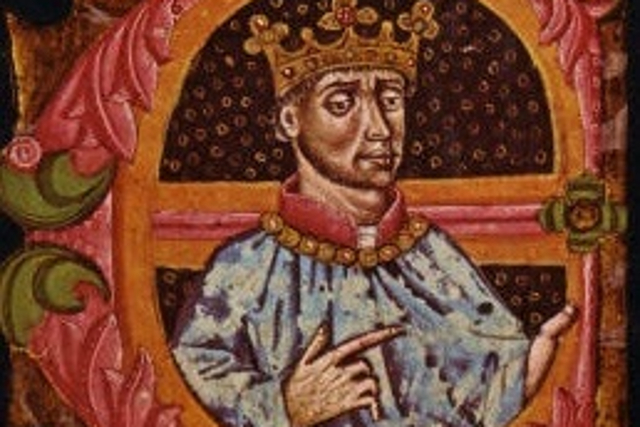Alexander the Great… Charles the Wise… Philip the Good…
When you die, you want to be remembered that way, but not everyone is so lucky. We've all had a nickname at one point or another that we hated, and we all know that feeling - it seems like they've always followed us around.
Unfortunately, for the following ten people, this is true. They have been gone for hundreds, even thousands of years, and yet the world still remembers them by their derogatory nicknames.
10. Drooling

Alfonso IX was king of León and Galicia for more than 40 years in the 12th and 13th centuries. In 1212, he founded the University of Salamanca, one of the oldest universities in the world. He also promoted democracy, establishing the earliest known parliamentary system in Europe, the Decree of Leon However, none of his efforts saved him from being remembered as Alfonso Baboso, also known as Alfonso the Slobbering .
The king was apparently prone to fits of rage when he foam was coming out of the mouth , hence the nickname. However, it should be noted that it was precisely this trait that Muslim historians mainly pointed out after his death. During his reign, King Alfonso took part in the Reconquista, a conflict between Christian kingdoms and Muslim caliphates aimed at driving the latter out of the Iberian Peninsula. So perhaps this was a way for the Muslim world to have the last laugh at the Drool.
9. Doing nothing

History is full of lazy, self-appointed royals who ignored their duties and used their positions mainly to laze around in luxury. This means that you have to work very hard doing nothing if you want to be immortalized for your laziness. Enter Louis V of France, which was technically still West Francia during his time in the 10th century. In France, the king is remembered as Louis Le Fainean , meaning Louis the Lazy or Louis the Idle. In English, he became known as Louis the Idle .
Louis was appointed co-regent as a teenager, while his father Lothair was still king. Then, when Lothair died in 986, 20-year-old Louis became the undisputed king of the Franks. His solo reign lasted a full year before he died in a hunting accident. Having spent his time "indulging in all sorts of frivolities "Instead of producing an heir, Louis died childless and ended his dynasty, thus sparking the beginning of the lost Capetian dynasty in France.
8. Head of sea onion

Even great rulers are not immune to offensive nicknames. Pericles was one of the most prominent and influential rulers of ancient Greece. His actions earned him the favorable nickname of "first citizen of Athens." However, political enemies and obscene Athenian poets had a less flattering nickname for him: Schinocephalos , which translates as "sea onion head" or "onion head".
This was due to the shape of Pericles' head, which was said to resemble the bulb of a squill. But let's To Plutarch explain this:
"His physical features were almost perfect, the only exception being his head, which was rather long and disproportionate. For this reason, in almost all his portraits he is depicted wearing a helmet, as the artists apparently did not want to tease him with this deformity."
7. Fratricide

If you think royal names can be a little confusing, wait until you hear about the Berenguers of the House of Barcelona. In the early 11th century, Berenguer Ramon I was the Count of Barcelona. He had a son whom he named Ramon Berenguer I, who in turn had twin boys in 1053 and decided to name them Berenguer Ramon II and Ramon Berenguer II .
To make things easier, we could try referring to them by their nicknames. Ramon Berenguer II was known as “Cap d’Estope,” or “the Fair-Haired,” because of his thick, light-blond hair. Meanwhile, his brother had the more unpleasant nickname of “el Fratricida” — Fratricide .
"Fratricide" refers to a person who kills their own brother or sister, so you can guess how Berenguer Ramon II got his nickname. In 1075, the brothers succeeded their father as the new rulers of Catalonia, but neither was a sharer. In 1082, Ramon Berenguer the Fair-Headed was killed in the Spanish forests on his way to Girona. His brother became sole ruler, and although his involvement in the deaths of his siblings was never proven, everyone assumed that he did it, so his new nickname of Berenguer Ramon the Fratricide followed him for the rest of his life.
6. The poorest man in France

John II, Duke of Alençon, was a 15th-century French nobleman and one of Joan of Arc's most ardent supporters, fighting alongside her against the English in the Loire Valley. For this, she gave him the commendatory nickname "le Beau Duc " - "The Handsome Duke."
As nicknames go, it sounds good, but things weren't always so rosy for the nobleman. His first military engagement proved disastrous. When he was just 15, John fought in Battle of Verneuil as part of the Hundred Years' War. The conflict was a triumphant victory for the English, who captured many French nobles, including John II.
The young Duke spent five years in captivity before he was finally able to raise the exorbitant ransom the English demanded for his release. But to scrape together the money, John had to sell almost everything he owned, so that although he was now a free man, he was also a penniless man. And just to kick him while he was down, he became derisively known as "the most a poor man in France ".
5. Slit-nosed

How would you feel if everyone called you by a nickname that reminded you of the most painful and humiliating thing that ever happened to you? Well, that was the fate of Justinian II, the emperor of the Byzantine Empire in the late 7th century. In 695, after a reign of 10 years, Emperor Justinian was overthrown by one of his generals named Leonty .
Oddly enough, Leontios decided not to kill his former master. Instead, Justinian was exiled and had his nose cut off as a reminder of his ordeal. Before you start feeling any sympathy for him, know that Justinian II was a cruel tyrant who was hated by the public, so when he was paraded through the streets, people began to jeer at him, shouting "Slit Nose!"! Cut Nose! "
And thus he became known as Justinian. Rhinothmetus , or Justinian the Slit-Nose. However, he had the last laugh. While in exile, Justinian donned a gold nose to hide his disfigurement. He then raised an army and, ten years after losing his throne, recaptured Constantinople, publicly beheading those who had plotted against him.
4. Ship's chest

When it came to nicknames, the Vikings were not only creative, but also straightforward. Most of them had something to do with the physical characteristics of the person being named. Erik Thorvaldsson, for example, one of the most prominent Scandinavian explorers in history, had a red beard and red hair, so he was known as Erik the Red. Okay, maybe that’s not the most creative name in the world, but we’re not here to talk about Erik the Red, we’re here to talk about his mother-in-law.
Her name was Thorbjorg Gilsdottir. She was married to Jórund Atlason and had a daughter together named Thjodhild, who later married Erik the Red. Thorbjorg was also known as " knarrarbringa ", which literally means"chest of the ship". Unfortunately, she rarely appears in the Old Norse sagas, mostly in passing association with Eric the Red, so we can only guess how she earned the nickname malapert.
3. Impotent

No one in history wants to be remembered as " Impotent ", isn't it? But such was the unfortunate fate of Henry IV, King of Castile.
At the time, royal marriages were almost always political, and consummation was a key part of the arrangement, as offspring served as a tool to unite the various royal families. So failure to "rise to the occasion" could have serious consequences, including war. It is certainly grounds for divorce.
Henry's first marriage was to Blanche of Navarre in 1440. They were together for 13 years but were unable to produce an heir. The marriage was eventually dissolved by cause of impotence The king allegedly tried to blame the spell for everything and even brought in prostitutes to testify that his "downstairs plumbing" was fine, but the annulment still took place.
Despite this, Henry remarried to Joan of Portugal, and she gave birth to a daughter named Joanna in 1462. One would think that this would put an end to the rude nickname, but it only made matters worse. Rumours circulated that Henry's wife had become pregnant by one of his court favourites, Beltran de la Cueva. Joanna earned her own infamous nickname, "La Beltraneja", mocking her supposed illegitimacy, while her father was immortalised in history as Henry the Impotent .
2. Lack of readiness

Now we know what you're thinking. Compared to some of the other nicknames on this list, "The Unprepared" doesn't sound too bad. However, this one earns extra points for infamy. While most of the other rulers mentioned here were mere historical footnotes, the king known as Ethelred the Unready, played a key role in English history.
He reigned as King of England for 37 years, although he is remembered as an ineffective ruler who failed to prevent the kingdom from being overrun by the invading Danes. His nickname did not mean "unprepared" in the modern sense. It was actually a pun on his name, Ethelred, which meant " noble advice ", because "unræd" meant " without advice " or "bad advice." So it was like calling him "Smart Dumb."
Aethelred demonstrated his lack of “noble counsel” on two specific occasions. First, in 991, when he began paying a large tribute known as Danegeld to force the Scandinavian forces to leave his kingdom alone. Then, in 1002, when he carried out the St. Brice's Day massacre and ordered the massacre of all the Danes in his kingdom.
Although there was no immediate effect, it eventually led to the fall of Æthelred's royal line, the House of Wessex, followed by the end of Anglo-Saxon rule in England as a whole following the Norman invasion a few decades later.
1. Dung beetle

It is often said that "history is written by the victors," but sometimes it is simply written by those who live the longest.
Constantine V was the emperor of the Byzantine Empire in the mid-8th century. Like his father, Leo III, he was a fanatic iconoclast , that is, he opposed the veneration of religious images, as he considered them heretical. But to simply say that he was “against” them would be a generous understatement. Throughout his reign, Constantine raided monasteries to destroy all their crosses, icons, and other religious trinkets. Those caught trying to hide such images or worship them were tortured, mutilated, and even executed.
Unsurprisingly, Constantine didn't have many admirers in the Orthodox Church. So they took revenge on him after his death by spreading a rumor that when he was a baby, Constantine had defecated during his baptism. into the baptismal font As rumors spread, Constantine V became known as Copronym - "dung name".













Оставить Комментарий